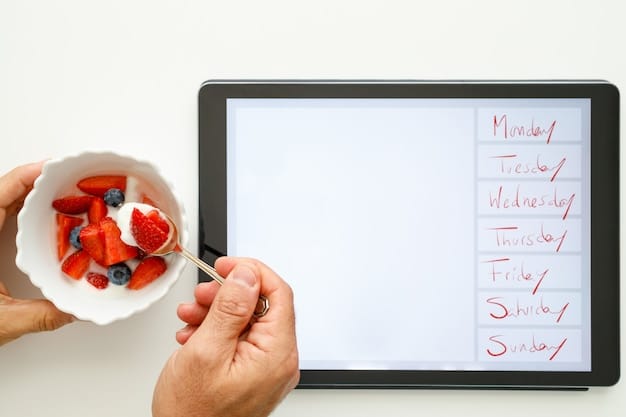Self-Care: Your Mental Health Priority in a Hectic World

Self-care is the practice of intentionally engaging in activities that reduce stress and maintain well-being, which is crucial in today’s fast-paced world for prioritizing mental health.
In the hustle and bustle of modern life, it’s easy to let personal well-being take a backseat. However, understanding the importance of self-care: prioritizing your mental health in a busy world is essential for maintaining a balanced and fulfilling life. Neglecting self-care can lead to burnout, increased stress levels, and a decline in overall mental and physical health.
Understanding Self-Care
Self-care isn’t a luxury; it’s a necessity. It involves taking deliberate actions to care for your physical, mental, and emotional health. Recognizing what self-care truly means and understanding its various dimensions can pave the way for a healthier, more balanced lifestyle.
What is Self-Care?
Self-care encompasses a wide range of practices that contribute to your overall well-being. It’s about consciously making choices that support your health and happiness. This might include activities as simple as taking a warm bath, reading a book, or going for a walk in nature.
Dimensions of Self-Care
Self-care isn’t one-size-fits-all. It has several dimensions, each crucial for holistic well-being. Understanding these dimensions can help you tailor your self-care practices to meet your specific needs.
- Physical Self-Care: This involves activities that nourish your body, such as eating healthy foods, getting enough sleep, and exercising regularly.
- Emotional Self-Care: This focuses on managing and expressing your feelings in healthy ways. It might include journaling, talking to a therapist, or engaging in creative expression.
- Social Self-Care: This involves connecting with others and building meaningful relationships. Spending time with loved ones, joining a club, or volunteering are great ways to foster social connections.
- Spiritual Self-Care: This involves connecting with your values and beliefs. It might include meditation, prayer, spending time in nature, or engaging in activities that bring you a sense of purpose.
In essence, self-care is about being proactive in managing your well-being. By understanding what it entails and recognizing its various dimensions, you can start integrating these practices into your daily life, nurturing your whole self.
The Vital Link Between Self-Care and Mental Health
The connection between self-care and mental health is profound. Engaging in self-care activities can significantly impact your mental well-being, reducing stress, improving mood, and boosting overall resilience. Ignoring self-care, conversely, can lead to a downward spiral in mental health.

Stress Reduction
One of the most significant benefits of self-care is its ability to reduce stress. High stress levels can impair cognitive function, weaken the immune system, and exacerbate mental health conditions like anxiety and depression. Self-care activities provide a buffer against these negative effects, helping you manage stress more effectively.
Mood Improvement
Self-care activities can also improve your mood. Engaging in activities you enjoy releases endorphins, natural mood boosters that can help alleviate feelings of sadness, anxiety, and irritability. Whether it’s listening to music, dancing, or simply spending time in nature, finding activities that bring you joy can have a powerful impact on your mental state.
Ultimately, self-care is not just about feeling good in the moment; it’s about building long-term mental resilience. By prioritizing self-care, you’re equipping yourself with the tools and strategies to navigate life’s challenges with greater ease and a stronger sense of well-being.
Practical Self-Care Strategies
Implementing self-care into your routine doesn’t require drastic changes; it’s about making small, consistent efforts to prioritize your well-being. Here are some practical self-care strategies you can start incorporating into your daily life.
Mindfulness and Meditation
Mindfulness and meditation are powerful tools for calming the mind and reducing stress. Taking just a few minutes each day to focus on your breath or practice guided meditation can make a significant difference in your mental state.
Physical Activity
Regular physical activity is not only good for your body but also for your mind. Exercise releases endorphins, reduces stress hormones, and improves overall mood. Whether it’s a brisk walk, a yoga class, or a gym workout, find an activity you enjoy and make it a regular part of your routine.
Setting Boundaries
Learning to set boundaries is essential for protecting your time and energy. This involves saying no to commitments that drain you, prioritizing your own needs, and creating healthy limits in your relationships. Setting boundaries can reduce stress and prevent burnout.
- Prioritize Sleep: Aim for 7-9 hours of quality sleep each night.
- Nourish Your Body: Eat a balanced diet rich in fruits, vegetables, and whole grains.
- Connect with Nature: Spend time outdoors, whether it’s a walk in the park or a hike in the mountains.
- Engage in Hobbies: Make time for activities you enjoy, whether it’s painting, reading, or playing a musical instrument.
These are just a few examples of practical self-care strategies. The key is to find what works best for you and make it a regular part of your life. Remember, even small acts of self-care can have a big impact on your mental health.
Overcoming Barriers to Self-Care
Despite understanding the importance of self-care, many people struggle to prioritize it in their lives. Common barriers include lack of time, guilt, and the perception that self-care is selfish. Overcoming these barriers requires a shift in mindset and a commitment to prioritizing your well-being.
Challenging Negative Beliefs
One of the biggest barriers to self-care is the belief that it’s selfish or indulgent. It’s important to challenge these negative beliefs and recognize that self-care is an essential part of maintaining your health and well-being. Taking care of yourself enables you to better care for others.
Time Management Strategies
Many people feel they don’t have enough time for self-care. However, with a few simple time management strategies, it’s possible to carve out space for activities that nourish your mind and body. This might involve scheduling self-care activities into your calendar, setting realistic expectations, and delegating tasks when possible.

Seeking Support
Sometimes, overcoming barriers to self-care requires seeking support from others. This might involve talking to a therapist, joining a support group, or simply confiding in a trusted friend or family member. Having a support system can provide encouragement, accountability, and a sense of connection.
By addressing these common barriers and implementing strategies to overcome them, you can make self-care a more consistent and sustainable part of your life. Remember, prioritizing your well-being is not selfish; it’s essential for living a healthy, balanced, and fulfilling life.
Self-Care for Caregivers
Caregivers often face unique challenges in prioritizing self-care. Whether caring for children, aging parents, or individuals with disabilities, the demands of caregiving can be overwhelming, leaving little time or energy for personal well-being. However, recognizing the importance of self-care is crucial for caregivers to avoid burnout and maintain their own health.
Recognizing Caregiver Burnout
Caregiver burnout is a state of physical, emotional, and mental exhaustion caused by prolonged stress. Symptoms include fatigue, irritability, anxiety, depression, and a sense of detachment. Recognizing these symptoms early is essential for taking steps to prevent or manage burnout.
Strategies for Caregiver Self-Care
Caregivers can implement several strategies to prioritize their self-care. These might include:
- Respite Care: Arranging for temporary care to take breaks and recharge.
- Support Groups: Joining a support group for caregivers to share experiences and receive encouragement.
- Setting Boundaries: Learning to say no and prioritizing personal needs.
- Seeking Professional Help: Consulting with a therapist or counselor to manage stress and emotions.
It’s also important for caregivers to practice mindfulness, engage in regular physical activity, and maintain social connections. These strategies can help caregivers manage stress, improve mood, and maintain their overall well-being. Remember, taking care of yourself is not selfish; it’s essential for providing the best possible care to others.
Building a Sustainable Self-Care Routine
Building a sustainable self-care routine is an ongoing process that requires self-awareness, experimentation, and flexibility. What works for you today might not work tomorrow, so it’s important to adapt and adjust your routine as your needs change.
Self-Reflection
Start by taking some time for self-reflection. What activities make you feel good? What are your stressors? What resources do you have available? Understanding your needs and preferences is the first step in building a self-care routine that works for you.
Experimentation
Don’t be afraid to experiment with different self-care activities. Try new things and see what resonates with you. This might involve exploring different types of exercise, trying new hobbies, or experimenting with mindfulness techniques.
Flexibility
Life is full of surprises, so it’s important to be flexible with your self-care routine. If you can’t fit in a full workout, maybe you can take a short walk. If you don’t have time for a long meditation, maybe you can practice a few minutes of deep breathing. The key is to find ways to incorporate self-care into your life, even when things are busy or stressful.
Remember, building a sustainable self-care routine is a journey, not a destination. Be patient with yourself, celebrate your successes, and learn from your challenges. With time and practice, you can create a routine that supports your well-being and helps you thrive.
| Key Point | Brief Description |
|---|---|
| 🧘 Mindfulness | Practicing mindfulness can reduce stress and improve mental clarity. |
| 💪 Physical Activity | Regular exercise boosts mood and reduces stress hormones. |
| 🚫 Setting Boundaries | Setting healthy boundaries protects your time and energy. |
| 🤝 Social Connection | Connecting with others can foster a sense of belonging and support. |
Frequently Asked Questions
▼
Self-care involves intentional actions aimed at enhancing physical, mental, and emotional well-being. It’s about making conscious choices that support personal health and happiness regularly.
▼
Self-care reduces stress, improves mood, and enhances resilience. By managing stress and promoting emotional stability, it plays a vital role in maintaining overall mental health.
▼
Start small by scheduling short activities like meditation, walks, or reading. Prioritize sleep, establish boundaries, and engage in hobbies to make self-care a habit.
▼
Lack of time, feelings of guilt, and the belief that self-care is selfish are common barriers. Addressing these beliefs and managing time effectively can help overcome these obstacles.
▼
Caregivers can utilize respite care, join support groups, and set personal boundaries. Additionally, seeking professional help and maintaining personal hobbies are vital for preventing burnout.
Conclusion
In conclusion, the importance of self-care: prioritizing your mental health in a busy world cannot be overstated. By integrating small, consistent self-care practices into your daily life, you can significantly improve your mental well-being, reduce stress, and build resilience. Embrace self-care as an essential component of your overall health and well-being, and make it a priority in your life.





